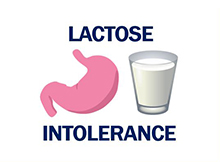Introduction:
In this case, the human body cannot digest lactose. Less lactase is produced in the body. Lactase is an enzyme used to break down lactose into glucose and galactose. Lactose is a disaccharide molecule composed of glucose and galactose. It is mainly found in dairy products. Lactose intolerance can cause bloating, gas and discomfort. Many people in the world have lactose intolerance and require comprehensive diet management to avoid complications.

Types of lactose intolerance:
Primary lactose intolerance: refers to the situation where the production of lactase in the body decreases with age and the absorption of lactose in the body decreases.
Secondary lactose intolerance: This is a condition caused by any disease present in the body, for example. Celiac disease.
Congenital lactose intolerance: This is a congenital lactase deficiency in some people. It is not very common.
Signs and symptoms of lactose intolerance:
1. Abdominal pain is mostly in the lower abdomen
2. Abdominal cramps
3. Bloating
4. Gas
5. Diarrhea
6. Nausea and vomiting
7. May have constipation
8. Lack of minerals and vitamins leads to low bone density
Causes and risk factors of lactose intolerance:
1. Avoid dairy products containing lactose, such as milk, goat milk, yogurt, butter and ice cream

2. Maintain a balanced diet
3. Foods containing lactose include potato chips, oatmeal, cakes, biscuits and cookies
Management and treatment of lactose intolerance:
It takes time to improve, and long-term recuperation treatment is recommended. Prevention is better than cure. The main preventive measure is to avoid dairy products as much as possible. Maintain healthy nutrition for the body. Change your diet for a healthy life. Take a diet high in vitamin D, get enough calcium necessary for bone and tooth health, and use leafy vegetables, nuts, and tofu to make up for calcium deficiency. Several drugs are used to treat lactose intolerance, including probiotics. It is also used for diarrhea and irritable bowel syndrome. It helps the body digest lactose. Most people use lactase supplements to break down lactose into smaller products and reduce the symptoms of the disease to a certain extent. Lactase tablets are used for treatment, but they are not effective for everyone.
If you have lactose intolerance, what complications will occur:
The bones become very fragile and lead to osteoporosis, in which bone density is reduced. This is very common in women. Malnutrition may be due to the body's lack of nutrients necessary for normal function. One of the patients experienced delayed wound healing. . It can cause digestive problems such as stomach cramps and stomach rumbling. Bloating is the main complication of this disease.




